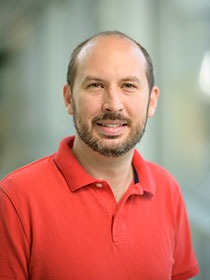
Christopher J. Halbrook, Ph.D.
The Halbrook lab is focused on investigating the interactions in the microenvironment of pancreatic cancer driving immune suppression and chemoresistance. Pancreatic cancer is a devastating disease, with a 5-year survival rate under 10%. This is in large part due to a lack of effective therapy options. Current immunotherapy modalities are rendered ineffective due to a strongly immunosuppressive microenvironment, where the malignant cancer cells are largely outnumbered by fibroblasts and immune cell populations. Importantly, all these cell populations exist in a nutrient-limited environment caused by the fibrotic nature of these tumors.
Accordingly, we are working to identify metabolic interactions among and within these populations that drive immune suppression in the pancreatic tumor microenvironment. For example, tumor associated macrophages are polarized by pancreatic cancer cells to strongly express arginase 1, this lack of arginine can suppress CD8 T cell activation / proliferation. Each of these axes represents a potential avenue to relieve immunosuppression. Furthermore, tumor associated macrophages also utilize a strongly mitochondrial metabolism vs. pro-inflammatory macrophages, which presents an opportunity to relieve or reprogram an immune suppressive population. We are actively working to target these interactions and identifying new pathways using a combination of mouse models, patient-derived organoids, single cell sequencing, and mass cytometry techniques.
